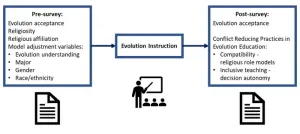(Press-News.org) Students in biology classes accepted the theory of evolution more often when it was taught with conflict-reducing practices, including an emphasis on religious compatibility and autonomy, according to a study published December 4, 2024 in the open-access journal PLOS ONE by Rahmi Ourota Aini and Elizabeth Barnes from Middle Tennessee State University, U.S., and colleagues.
Evolution is of the foundation of biology, but currently half of the United States population rejects the idea of human evolution. One of the most important factors in the acceptance of evolution is perceived conflict between evolution and a student’s religious beliefs.
The authors of this study surveyed 6,719 college biology students in 55 courses and 14 states. In addition to assessing religiosity, they asked the students for their experiences of an instructor teaching evolution with conflict-reducing practices. For example, instructors could offer compatibility between evolution and religion, offering examples of religious leaders who accept evolution or scientists who are religious. Instructors could also reduce conflict by emphasizing the autonomy of the students—noting that it is their choice whether to accept evolution or not.
Highly religious Christian students were more likely to accept evolution when instructors emphasized the compatibility of evolution and religion. However, all students, regardless of whether they were religious or not, were more likely to accept human evolution when instructors emphasized that it was their choice to do so.
While the instructors and classes were self-selected for the study, the results suggest that conflict resolution strategies like emphasizing compatibility between religion and evolution and a student’s autonomy can increase students’ acceptance of evolution.
The authors add: “This study reinforces a growing number of research studies showing that conflict between religion and evolution is often unnecessary. College instructors can play an important role in bridging the divide. By adopting practices that reduce perceived conflict, our findings suggest that more students and the broader public can come to embrace evolution, the cornerstone of the biological sciences.”
#####
In your coverage please use this URL to provide access to the freely available article in PLOS ONE: https://journals.plos.org/plosone/article?id=10.1371/journal.pone.0313490
Citation: Aini RQ, Supriya K, Dunlop H, Edwards B, Maas S, Roberts J, et al. (2024) Conflict reducing practices in evolution education are associated with increases in evolution acceptance in a large naturalistic study. PLoS ONE 19(12): e0313490. https://doi.org/10.1371/journal.pone.0313490
Author Countries: U.S.
Funding: This study is funded by National Science Foundation #1818659. The funders had role in data collection.
END
Not red in tooth and claw: Teaching evolution with conflict reduction practices increases acceptance
Highly religious Christian students accepted evolution more when it was taught with conflict reduction practices
2024-12-04
ELSE PRESS RELEASES FROM THIS DATE:
Emoji use may depend on emotional intelligence and attachment style
2024-12-04
Higher emotional intelligence is linked to more emoji use with friends, while avoidant attachment is associated with less emoji use with friends and dating or romantic partners, according to a study published December 4, 2024, in the open-access journal PLOS ONE by Dr. Simon Dubé, Research Fellow at The Kinsey Institute, Indiana University, U.S., and colleagues. This pattern of results varies across genders and relationship types, with women using emojis with friends and family more frequently than men.
Emojis are characters depicting emotions, objects, animals, and more. They can be sent ...
Study reveals mammoth as key food source for ancient Americans
2024-12-04
Scientists have uncovered the first direct evidence that ancient Americans relied primarily on mammoth and other large animals for food. Their research sheds new light on both the rapid expansion of humans throughout the Americas and the extinction of large ice age mammals.
The study, featured on the Dec. 4 cover of the journal Science Advances, used stable isotope analysis to model the diet of the mother of an infant discovered at a 13,000-year-old Clovis burial site in Montana. Before this study, prehistoric diet was inferred by ...
Male African elephants develop distinct personality traits as they age
2024-12-04
Male African elephants have distinct personality traits, but also adapt their behavior to suit the social context, according to a study publishing December 4, 2024, in the open-access journal PLOS ONE by Caitlin O’Connell-Rodwell at Stanford University and Harvard University Center for the Environment, Jodie L. Berezin of Utopia Scientific, U.S., and colleagues.
Many animals show consistent individual differences in behavior, sometimes described as ‘personality’ or ‘temperament’. Elephants are highly intelligent and have rich social lives, and previous research has shown that captive ...
Mass General Brigham research leads to new insights on preventing brain injury after cardiac arrest
2024-12-04
KEY TAKEAWAYS
A team led by researchers at Mass General Brigham built the first immunology-focused biobank with samples from patients who experienced out-of-hospital cardiac arrest.
Samples from the biobank provided a unique window into the immunological changes that take place after cardiac arrest.
Researchers uncovered a population of cells that may provide protection from brain injury following cardiac arrest, leading them to examine a drug that can activate these cells to improve neurological outcomes.
Despite ...
Study exposes link between genetic risk of depression and heart disease in women
2024-12-04
Women who have a high genetic risk of depression are more likely to develop heart disease, University of Queensland researchers have found.
During a study that analysed genetic and health data from more than 300,000 people, Dr Sonia Shah and Dr Clara Jiang from UQ’s Institute for Molecular Bioscience found women who had a high genetic risk of developing depression also had a high risk of developing heart disease, even in the absence of a depression diagnosis.
Dr Shah said these results exposed a difference in the risk for women compared ...
How breast cancer cells survive in bone marrow after remission
2024-12-04
A study from researchers at the University of Michigan and the University of California San Diego has shed light on a previously poorly understood aspect of breast cancer recurrence: how cancer cells survive in bone marrow despite targeted therapies.
The paper, “Breast cancers that disseminate to bone marrow acquire aggressive phenotypes through CX43-related tumor-stroma tunnels,” appears in the Journal of Clinical Investigation.
Estrogen receptor positive breast cancer is the most ...
Closing underperforming hospitals could worsen health inequality in rural areas, finds new study
2024-12-04
Closing underperforming hospitals could worsen health inequality in rural areas, finds new study
Closing underperforming hospitals may do more harm than good, particularly in rural areas -regardless of their performance status, according to new research from the University of Surrey. The study shows that while the promise of improved care quality often justifies hospital closures, they risk exacerbating health inequalities, particularly for patients who already face longer travel distances for treatment.
The study, published in Regional Science and Urban Economics, which focused on elective hip replacement ...
New tool enhances control of cellular activity
2024-12-04
A basic function of cells is that they act in response to their environments. It makes sense, then, that a goal of scientists is to control that process, making cells respond how they want to what they want.
One avenue for this ambition is cell receptors, which function like ignition slots on a cell, requiring keys – such as specific hormones, drugs, or antigens – to start up specific cellular activities. There are already synthetic receptors that give us some control over this sequence of events, most famously the chimeric antigen receptors used in CAR-T cell cancer therapy. But existing synthetic receptors are limited in the variety of keys ...
Genetic data from ‘biobanks’ may help improve prediction of effectiveness, side effects of common medications, study finds
2024-12-04
A UCLA study has outlined a new framework that researchers say would improve predictive power of genetics to determine how well a patient would respond to commonly prescribed medications as well as the severity of any side effects.
Published in the journal Cell Genomics, the study found that data from large libraries of sequenced human genomes and other biological data, known as biobanks, can provide new insights into genetic architecture of response to widely prescribed drugs.
Study first author and UCLA Bioinformatics Ph.D. candidate Michal Sadowski said the most ...
Richard Baraniuk honored with 2025 IEEE Signal Processing Medal
2024-12-04
Richard G. Baraniuk, the C. Sidney Burrus Professor of Electrical and Computer Engineering at Rice University, has been awarded the 2025 IEEE Jack S. Kilby Signal Processing Medal. This honor recognizes Baraniuk’s exceptional achievements in signal processing, particularly his pioneering work in multiscale and sparse signal processing. Notably, Baraniuk’s professorship is named after his mentor, Charles Sidney Burrus, a former dean of engineering at Rice, who also won the Kilby Medal in 2009.
Baraniuk’s innovative contributions have advanced the theoretical and practical frontiers of signal processing and machine learning. His work has focused on low-dimensional models, ...
LAST 30 PRESS RELEASES:
SfN announces Early Career Policy Ambassadors Class of 2026
Spiritual practices strongly associated with reduced risk for hazardous alcohol and drug use
Novel vaccine protects against C. diff disease and recurrence
An “electrical” circadian clock balances growth between shoots and roots
Largest study of rare skin cancer in Mexican patients shows its more complex than previously thought
Colonists dredged away Sydney’s natural oyster reefs. Now science knows how best to restore them.
Joint and independent associations of gestational diabetes and depression with childhood obesity
Spirituality and harmful or hazardous alcohol and other drug use
New plastic material could solve energy storage challenge, researchers report
Mapping protein production in brain cells yields new insights for brain disease
Exposing a hidden anchor for HIV replication
Can Europe be climate-neutral by 2050? New monitor tracks the pace of the energy transition
Major heart attack study reveals ‘survival paradox’: Frail men at higher risk of death than women despite better treatment
Medicare patients get different stroke care depending on plan, analysis reveals
Polyploidy-induced senescence may drive aging, tissue repair, and cancer risk
Study shows that treating patients with lifestyle medicine may help reduce clinician burnout
Experimental and numerical framework for acoustic streaming prediction in mid-air phased arrays
Ancestral motif enables broad DNA binding by NIN, a master regulator of rhizobial symbiosis
Macrophage immune cells need constant reminders to retain memories of prior infections
Ultra-endurance running may accelerate aging and breakdown of red blood cells
Ancient mind-body practice proven to lower blood pressure in clinical trial
SwRI to create advanced Product Lifecycle Management system for the Air Force
Natural selection operates on multiple levels, comprehensive review of scientific studies shows
Developing a national research program on liquid metals for fusion
AI-powered ECG could help guide lifelong heart monitoring for patients with repaired tetralogy of fallot
Global shark bites return to average in 2025, with a smaller proportion in the United States
Millions are unaware of heart risks that don’t start in the heart
What freezing plants in blocks of ice can tell us about the future of Svalbard’s plant communities
A new vascularized tissueoid-on-a-chip model for liver regeneration and transplant rejection
Augmented reality menus may help restaurants attract more customers, improve brand perceptions
[Press-News.org] Not red in tooth and claw: Teaching evolution with conflict reduction practices increases acceptanceHighly religious Christian students accepted evolution more when it was taught with conflict reduction practices




